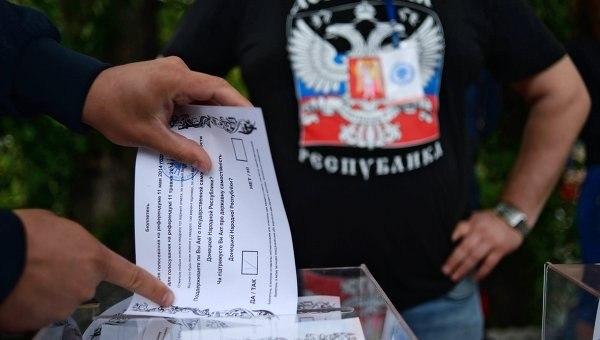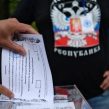
Moscow Seeks to Upgrade the Status of Donetsk-Luhansk in Negotiating Formats (Part One)
Publication: Eurasia Daily Monitor Volume: 11 Issue: 202
By:

Russia’s position has always been one of creative ambiguity regarding the recognition of territorial secessions from countries in Europe’s East (Georgia, Moldova, Ukraine). In each case, Russian military forces (already in place or intruding) were the direct enablers of secession. The Kremlin’s position on the status of seized territories has varied from case to case, and over time in each case (Abkhazia, South Ossetia, Transnistria and, most recently, Crimea).
Invariably, however, the official position was designed to eschew Russia’s direct responsibility for aggression; shift responsibility onto local proxies; foster Western passivity regarding these territorial seizures; create parallel de facto and de jure situations in each territory; secure more time to consolidate gains on the ground until they become impregnable; and ultimately, to “legalize” the situation unilaterally, whether through Russian “recognition” of the territory’s “independence” or through its outright annexation to Russia.
Russian diplomacy is surpassing its own inventiveness in the case of the Donetsk and Luhansk “people’s republics” (“DPR, LPR”) on territories recently seized from Ukraine. Unlike its policy on the earlier conflicts, Moscow now seeks to equate the unrecognized secessionist authorities with the country’s recognized government in terms of political legitimacy. The Kremlin scheduled the “DPR-LPR elections” for November 2 as a direct response to Ukraine’s October 26 parliamentary elections. It aims to bring the newly “legitimized” Donetsk-Luhansk authorities into two sets of negotiations, co-equally with Kyiv: in the international conflict-resolution format and in a bilateral dialogue with Ukraine’s post-election government.
—Parallel Recognition of Election Outcomes
The Russian government has adopted a policy of parallel recognition of two sets of elections in Ukraine: the country’s parliamentary elections and the “elections” in the Russian-controlled parts of Donbas (eastern Ukrainian region encompassing the Donetsk and Luhansk provinces).
Moscow’s parallel recognition of elections in Ukraine features three novel characteristics. It is pre-emptive, as Moscow recognized the results of both sets of elections in advance of the voting. It is also a non-normative recognition, which Moscow bestows without pretending to evaluate the standards of either electoral process (not even contesting the validity of the Ukrainian elections’ outcome). And it treats the two sets of elections as equivalent, although one is validated internationally while the other is recognized by Russia alone.
Russia’s presidential administration chief, Sergei Ivanov, communicated the decision to treat Ukraine’s parliamentary elections as valid three days ahead of the October 26 vote. In the same statement, Ivanov pre-emptively implied that Russia would recognize the “DPR-LPR elections’ ” results: “These new entities or territories—call them what you like—must have their elected leaders; then a process of pasting together will follow” (Komsomolskaya Pravda, October 23; Rossiyskaya Gazeta, October 24). Two days after Ukraine’s October 26 vote, Russian Foreign Affairs Minister Sergei Lavrov unambiguously recognized those elections’ outcome as valid. But he also declared that the Donetsk-Luhansk “elections are important for the legitimization of power there. We will, of course, recognize their results” (Izvestiya, Interfax, October 28).
Following the November 2 elections there, Russia’s Ministry of Foreign Affairs declared its “respect for the expression of will of the [‘DPR-LPR’] population.” Their elected leaders are mandated “to establish a dialogue between the central Ukrainian authorities and the representatives of Donbas” (Interfax, November 2). Russia’s ambassador to the Organization for Security and Cooperation in Europe (OSCE), Andrei Kelin, underscored the parallel recognition policy in his speech to the organization’s Permanent Council: “Russia has recognized the political choice of Ukraine’s citizens who voted on October 26 [in the parliamentary elections]. Russia has declared its readiness to cooperate with Ukraine’s parliament and government in their new composition. The voters of the Donetsk and Luhansk regions, for their part, have also expressed their will. We heard it, we respect it. It is necessary to take their will into account” (Interfax, November 7).
—De Facto Recognition of Secessionist Leaders
For the time being, Russia stops short of recognizing officially the two “people’s republics.” Instead, Russia unilaterally legitimizes their “elections” and the resulting political authorities. Moreover, Russia has obtained a measure of international acceptance for “DPR-LPR” leaders by inserting them into negotiation formats. The OSCE and Germany helped to create the Contact Group (comprised of Kyiv, Moscow and the OSCE) in June in Donetsk, with the participation of as yet un-“elected” Donetsk and Luhansk leaders. Aleksandr Zakharchenko and Igor Plotnitsky signed the two armistice agreements (albeit in an unstated capacity) alongside the Contact Group in September, thus gaining some international standing.
Moscow takes the position that the “DPR-LPR elections” in early November have politically legitimized the Donetsk and Luhansk authorities. Moscow argues that those authorities now hold representative mandates, entitling them to an upgraded status in conflict-resolution negotiations. Russia’s Foreign Minister Lavrov also told his counterpart from the United States, John Kerry, that Washington and Moscow should urgently encourage a direct dialogue between Kyiv and Donetsk-Luhansk. A direct dialogue, according to Lavrov, would help implement the ceasefire in Ukraine’s east, and stability more broadly (Interfax, November 8, 10).
Moscow, however, demonstrates its interest in destabilizing Donbas as a means to force Kyiv into concessions to Donetsk-Luhansk. Following the elections there, Russia is transferring heavy weaponry massively to Donetsk and Luhansk, no longer bothering to conceal such transfers (perhaps for intimidating effect). Such would be the backdrop to any “direct dialogue” between Kyiv and Donetsk-Luhansk. At a minimum it would contribute to a creeping political legitimation of the secessionist leaderships by setting them on an equal footing in dialogue with the Ukrainian government.
TO READ PART TWO, CLICK HERE.




